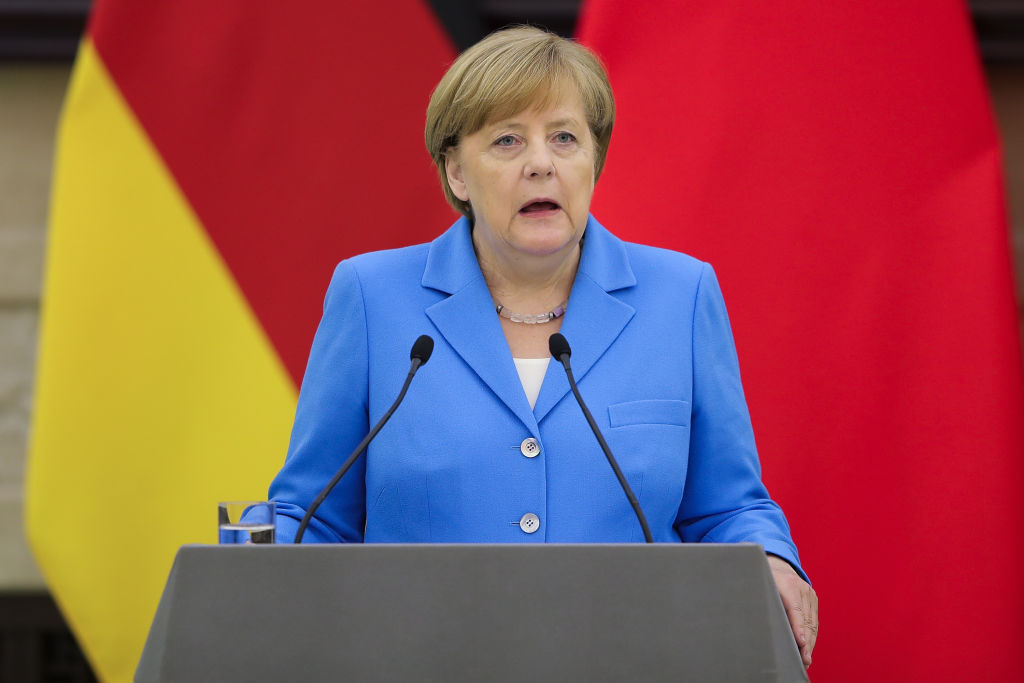As Europe weighs what course to take in the face of Beijing’s growing belligerence, it has become increasingly clear that the decision depends on Berlin. Germany is China’s most important counterpart on the continent. Unfortunately for Europe, it is equally clear that Germany’s economic entanglement with China has become so extensive that reversing it is no longer a realistic option.
Germany’s big industrial powerhouses, including Volkswagen and the engineering conglomerate Siemens, were among the first European companies that made the jump to China in the 1980s and have benefited from the unparalleled economic growth in the East. However, over the years the likes of Volkswagen and Siemens developed an unhealthy economic dependency on the Chinese market. While domestic consumption stagnated, the demographic growth and rise of the middle class at the Pacific coastline promised rising profits.
Last year alone, Germany exported nearly €100 billion ($119 billion) worth of goods to China, accounting for more than half of the value of all EU exports to the country. Germany bought even more from China than it exported there, making the country its biggest overall trading partner. The United States may be Germany’s biggest export market, but China is what has driven Germany’s export growth.
It is not just trade, though. German companies went all-in on China. Siemens, Volkswagen and the chemical giant BASF have established local production with domestic workforces in China. These companies have invested huge sums into building factories and setting up infrastructures. It is too late to draw back from their Chinese engagement. They need the market, and they need to be in good graces with the political leadership in Beijing.
That reliance is the main reason Chancellor Angela Merkel has preferred to ignore calls for decisive action on China in response to the violence in Hong Kong and the treatment of Uighurs. What Berlin has usually done in the past is to condemn human rights violations, while never holding its companies back from exporting to and investing in China. As the dependency grew, the political relationship between the two countries became ‘complicated’ as officials in Berlin like to call it. What ‘complicated’ entails is that the economy fears any kind of harsh criticism aimed at Beijing could cause a backlash in the form of tariffs, penalties or new regulations that favor Chinese companies over foreign ones.
That fear is justified. For many years, Beijing did not care about criticism coming from its European partners. China usually complained on cue when it was attacked for its actions in Tibet or elsewhere, and then forgot about it a few days later. All the while, the business ties remained intact and untouched. What has changed in the last year or so is that Beijing has seemingly become thin-skinned and increasingly willing to punish foreign partners for any ‘intrusion into its domestic affairs.’
Even Germany has not been spared from punishment. A few days ago, China declared it would ban pork imports from Germany. This mere tactical move on the eve of critical trade and investment talks should show that China has the leverage to undermine any country. The specific context of the ban is that Germany plays a key role in the ongoing EU-China investment negotiations China hopes could conclude by the end of the year.
Beijing knows that Berlin is the most powerful player in Europe. Not one decision of importance is made without the nod from Merkel. Brussels has warned it may impose new restrictions on Chinese investments into Europe unless Beijing agrees to level the playing field on trade and reduce a long list of obstacles facing European companies in China. This set off alarm bells in Beijing. The pork import ban fits a pattern of ‘coercive diplomacy’, in which China imposes trade and investment restrictions on countries it intends to put under pressure or punish for disagreements.
[special_offer]
Merkel already feels the pressure at home, as Germany’s farmers’ association has voiced its concern about the ban which is a major blow to the country’s pork exporters. China counts for almost two-thirds of their business. German pork exports to China totaled €835 million ($991 million) in the first half of this year, compared with €1.2 billion ($1.42 billion) for all of last year. The dependency is not limited to cars, machine and chemical products.
Following the virtual EU-China summit on Monday (a small-scale substitute for the summit that was initially planned to take place in Leipzig), Merkel and European Commission president Ursula von der Leyen avoided calling out China for its recent actions. The closest to an actual political statement von der Leyen came was saying that ‘China needs to convince us that it is worth having an investment agreement’.
For the most part, the Germans were once again dancing around a confrontation with the big and uncontrollable power from the East.
This article was originally published onThe Spectator’s UK website.


















